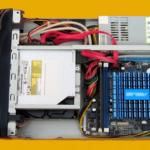Furthermore, Windows has strategically placed itself as the go-to OS in the world and most devices have partnered with them and are providing Windows as their default OS. This highlights the problems of users being forced to use something.
However, there are always options. To make up your mind, today we will discuss the top 5 reasons why Linux is a better operating system than Windows.
1. Free of Cost
First and foremost, the major difference between both operating systems is that Linux is free whereas Windows is not. For those interested in premium quality, Linux is the go-to solution irrespective of the fact whether they want to utilize their OS as a desktop or a server.
In addition to that, the related applications are also completely free and open source. This is a massive difference when drawing a comparison with Windows. Although Windows does provide the flexibility of installing free software – they are generally cracked meaning that they are an illegal copy of the original software.
This also raises a key point of security, which Linux deals with swiftly. On the other hand, Windows is prone to security threats and other Trojans; this also eliminates the need for an anti-virus in Linux-based systems.
For those looking for a free and a safer option, Linux is the obvious answer.
2. Compatible with Lower-end Hardware
To improve the user experience, Windows put a minimum hardware requirement which limits users who own a lower tier device. The newer version of Windows, such as 7, 8 and 10 require at least 1GB RAM. The Windows experience on devices, which barely meet the minimum requirement, is rather poor; the devices experience awfully slow performance along with auto shutdown of the devices.
Similarly, older generation laptops have aging components and since Linux consumes fewer system resources (RAM, disk space etc), it makes Linux the ideal operating system for those devices.
With the introduction of simpler distros like Ubuntu and Elementary OS, users migrating from Windows can enjoy similar but simpler graphical user-friendliness. This acts as an added incentive as to why users should opt for Linux.
3. No need for drivers anymore:
If you have ever used a Windows device for an extensive period of time, then you are automatically aware of the struggle of finding drivers for the device itself and for other devices you want to connect for example a printer.
With Linux, users don’t have to worry about additional drivers as most of them are supported directly by the Linux kernel; this implies that most devices are plug and play for Linux, which is a huge advantage for consumers.
This alone can be a reason to switch to Linux as the annoyance of having to deal with finding the right drivers and making them work with the particular model of the device you have.
4. Reliability is Key!
How often have you ended up pressing the Ctrl-Alt-Del combination on Windows? Probably enough times to lose count. This is one of the biggest drawbacks of Windows operating system that applications often face issues while launching, often aggravated due to device’s limitations.
However, with Linux, users experience unparalleled up-time. The operating system provides built-in security which helps keep the system secure from all the harm which might be caused later on.
Traditionally, Unix-like systems are renowned for running without registering a single issue or failure which demands a restart; this is a key aspect to consider when choosing a server system. This is why most servers in the modern world are running Linux.
5. Massive Community Support
The best thing about being a Linux user is perhaps that you will never feel alone if an issue arises. Apart from a handful of forums, you can drop by any forum with your problems; either you will find a solution right away or someone will always try to help you out since the community members are very active.
There is no doubt that every operating system has its pros and cons. However, Linux has many reasons to be picked over Windows OS. Linux provides flexibility and good control over everything whereas those things are limited in Windows OS. The number of flavors it provides can cater to the needs of various users; be it a graphic designer, programmer or a content writer.
What do you think about our list? If you are an avid user of Linux let us know what you like most about the OS and how it compares with Windows OS?







